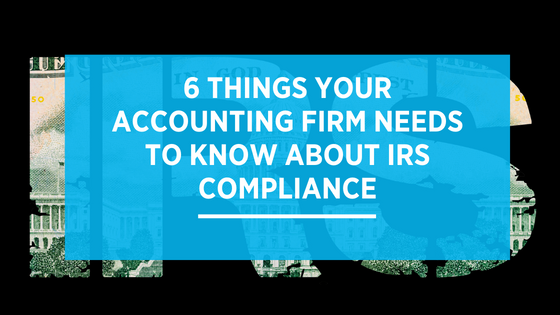6 Things Your Accounting Firm Needs to Know About IRS Compliance

As an accounting firm, securing sensitive client information is not only an essential component of running your business, but it’s also a federal requirement.
Protecting taxpayer information is a priority for the IRS. As a priority project, they released new federal regulations and guidelines tax professionals must comply with.
This post outlines the six things your accounting firm must know to comply with IRS safeguards and protect sensitive client and business information with ease, including:
- 1. Understanding the FTC Safeguard Rules
- 2. Creating an Implementation Plan for Your Accounting Firm’s Data Controls
- 3. Defining Basic Security Measures for You and Your Clients
- 4. Monitoring and Defending Against Scams and Data Theft
- 5. Training and Managing Employees for Ultimate Data Security
- 6. Hiring an IT Management Solutions Partner
Know The FTC Safeguard Rules
Since its inception in 2015, the IRS’s Security Summit has brought together state agencies and private-sector industry experts to create cyber security work groups to identify and establish security requirements for tax professionals.
The Security Summit routinely publishes guides and other helpful resources to help tax professionals understand and adequately meet federal regulatory requirements.
One of the first requirements your accounting firm should be aware of is the Gramm-Leach-Bliley (GLB) Act. The GLB act requires financial institutions like your accounting firm to maintain the security and confidentiality of financial information. The GLB Act triggered the creation of the Federal Trade Commission’s (FTC) Safeguards Rule. According to this rule, accounting firms must create and implement written information security plans to safeguard sensitive taxpayer information. Failure to comply with these regulations may result in agency investigation.
The first step is ensuring your accounting team is familiar with the Safeguards Rule and understands the importance of complying with the outlined requirements. Read the IRS Security Summit’s published a guide titled “Safeguarding Taxpayer Data: A Guide For Your Business” for a detailed approach to this process.
Create an Implementation Plan
As you work through the Safeguards Rule, you’ll notice that a robust implementation plan is one of the first steps your accounting firm should take in order to meet the FTC and IRS compliance requirements.
An implementation plan for your accounting firm may look like this:
- 1. An accurate list of all your information systems, networks, and storage processes to better understand security gaps and needed improvements.
- 2. An outline of your client data storage process clearly defining how and where sensitive taxpayer information is stored across your business network.
- 3. Documenting how often and where records are being backed up and archived to address potential security concerns.
- 4. Confirming your email encryption software is used appropriately by all employees when handling sensitive client taxpayer information.
- 5. Understanding the security management system you have in place to detect potential security breaches and the protocol your team uses to defend and inform the appropriate agencies about any successful breach of sensitive information.
Once you have a general understanding and detailed records of your current process for securing sensitive client data, your accounting firm can create a strategy for bridging gaps, increasing security, and enhancing internal data safeguards.
Set Up Basic Security Measures
Your accounting firm’s next step in complying with IRS requirements is drafting a written data security plan.
As we recently outlined in another post, What is a Data Security Plan: 3 Steps to Create Yours Today, your data security plan must take into consideration your unique business attributes like size, type of services you deliver, and the nature of taxpayer data you collect.
Reviewing your internal control process is an additional step in complying with federal safeguarding requirements. Identify any gaps from the implementation plan you created and start to fill any gaps in your internal security process by considering the following:
- 1. Install business-grade anti-virus software across all business devices or update existing anti-malware to ensure routine maintenance.
- 2. Create a password management program across all devices, software, and account to ensure each password used within your accounting firm is strong (8 or more characters) and different for each login.
- 3. Updating your backup system to a remote and external location separate from your existing network.
- 4. Take steps to encrypt sensitive taxpayer data, including emails that may contain protected client information.
- 5. Implement a document sharing program where only those on a need-to-know basis can access taxpayer information.
- 6. Encourage your clients to use a PIN to protect their identity when filing tax information with your accounting firm and the IRS.
Read through this post for more details on specific security steps you should take to protect your accounting firm and your client information safe.
Always Be on Guard For Potential Security Breaches
It’s not enough to simply create a written data security plan if you want your accounting firm to comply fully with the FTC and IRS requirements. Data theft is common, and remaining vigilant about how your accounting firm may experience a security breach is an essential component of IRS compliance.
Knowing what to be on the lookout for can help you monitor for suspicious activity, including:
- 1. Monitoring client e-filed tax returns for identity theft issues like a Social Security number already in use, clients receiving authentication letters without filing, clients receiving refunds before filing, and receiving tax transcripts without a formal request.
- 2. Phishing scams that may try to pose as your bank, the IRS, tax software representatives, and even a potential lead.
- 3. Awareness about internet safety, including updating browser software, safely downloading information to your computer from external sources and routinely deleting browser history, cookies, and cache.
Even the best-protected accounting firm systems can suffer from compromised security. Contact the IRS and your local law enforcement agency if you become aware of data loss or theft. The IRS will connect you with your local IRS liaison to help guide you through the necessary steps to mitigate any damage to your firm or client’s information. This stakeholder liaison will direct you to contact the FBI in certain circumstances.
In addition to contacting the IRS and other federal agency stakeholders, you must also inform the state where you prepare state returns. You can find this information through your local state attorney general or tax administration office.
Finally, if your accounting firm is the victim of a cybersecurity breach, contact an IT security expert like ABL Computers immediately. We’ll help you identify how the breach took place and how to prevent further security breaches in the future.
Create a Robust Employee Training & Support Plan
One of the most critical components to complying with IRS safeguarding requirements is ensuring all your employees understand why these safeguards are in place and how they can do their part to secure sensitive client data.
Make sure to engage your employees throughout the process of creating a written data security plan and any plans to bridge any gaps in your internal systems security process.
Educate your accounting team on the importance of updating and maintaining system security and defining good cybersecurity habits like frequent password changes, routine software updates, and maintaining client confidentiality.
Review the Employee Management and Training section of the IRS Safeguarding Taxpayer Data guide for a thorough checklist on hiring and training new accounting employees, and maintaining a robust management education program to help all team members comply with IRS data security requirements.
Hire an IT Management Solutions Firm
Complying with the IRS and other federal agency data security requirements requires a robust strategy and routine maintenance of all systems, hardware, and software your accounting firm relies on.
At ABL Computers, we understand how difficult it can be to comply with these requirements while running a successful accounting business. That’s why we offer our expert managed IT solutions service.
Our managed IT solutions service brings an expert cybersecurity and IT team in-house. We understand your unique business goals and tailor your data security package to fit your firm’s budget to easily comply with IRS regulations and protect your accounting firm without the hassle.
Helping you identify gaps in your internal security controls, guiding you as you write your data security plan, and creating long-term cybersecurity and IT maintenance strategy is what we do best.
Contact us today to ensure your accounting firm complies with federal regulations to secure sensitive client information.

